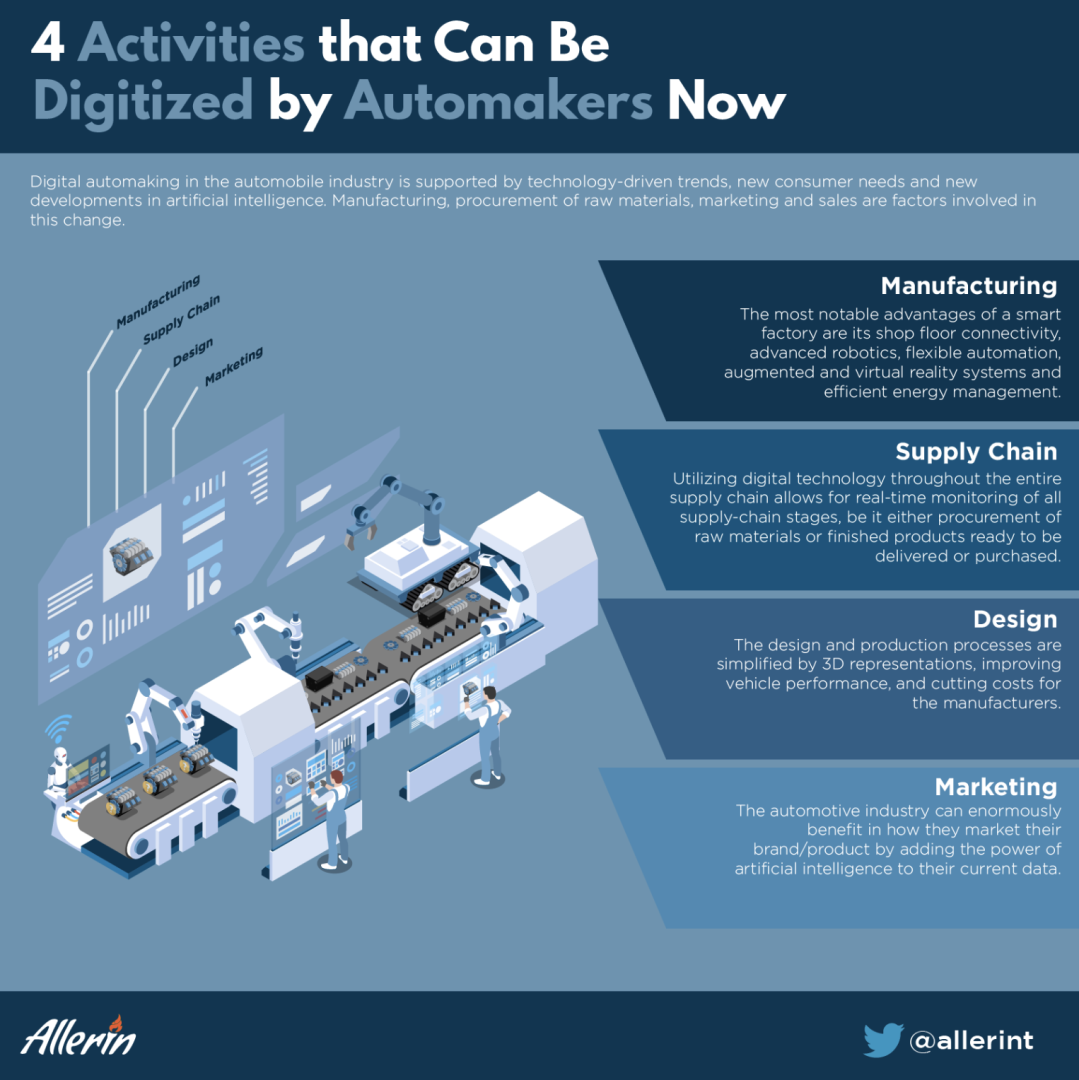TECHNOLOGY
4 Activities that Automakers Can Digitize Now

Digital automaking is supported by technology-driven trends, consumer needs and new developments in artificial intelligence.
Manufacturing, procurement of raw materials, marketing and sales are factors involved in this change.
Digital automaking is a process that combines simulation, three-dimensional visualizations, analytics and several tool partnerships to make automotive manufacturing easier. Since the automotive industry has been undergoing a digital transformation primarily driven by intelligent mobility, it has encouraged the market to adopt new technology and software for modern vehicles. There has also been a growing need to increase industrial processes’ sustainability, environmental friendliness and adaptability. All of this has made automotive digitalization extremely important.
Automotive digitization helps to keep precise control over business operations, which is made possible using modern technologies like ML (machine learning) and AI (artificial intelligence) to improve short- and long-term performance.
Automotive digitization has also increased the capacity to monitor each component of the supply chain while lowering costs and risks. Digital automaking can offer automotive solutions in terms of better design, time efficiency, and many other industry solutions.
4 Activities that Can Be Digitized by Automakers Now

1. Manufacturing
Customers desire tailored goods, but they don’t want to pay more than they would for items that are mass-produced. As a result, manufacturing must be more adaptable than ever, leading to mass customization. Thus, the design, fabrication, use and maintenance of products are changing as a result of the digitalization of manufacturing. It is also changing the operations, procedures and energy footprint of supply chains and more. Digital manufacturing enables firms to provide additional options that are tailored to individual customers. Businesses can better understand supply-chain challenges, including inventory levels, delivery status and demand cycles, thanks to digital manufacturing.
The factories of the future will move from automation to autonomy, strengthening real-time communication between equipment, physical systems, and people. These factories are referred to as smart factories. The most notable advantages of a smart factory are its shop floor connectivity, advanced robotics, flexible automation, augmented and virtual reality systems, and efficient energy management. The general manufacturing sector’s global standards are established by the automotive industry.
Over the past two decades, the automotive sector has expanded tremendously. However, the main elements that will affect whether digitalization is successfully implemented are the significance of realizing a return on investment (RoI) and the willingness of employees at both the top-most and lowest levels of an organization.
2. Supply Chain
By removing the functional barriers that divide different areas, the digitization of the supply chain is a cross-functional process that spans the entire lifecycle of a vehicle or product and involves all company divisions. It allows for an ecosystem that connects all stakeholders, from raw material and component suppliers to logistics companies, dealers and customers.
Utilizing digital technology throughout the entire supply chain allows for real-time monitoring of all supply-chain stages, be it either procurement of raw materials or finished products ready to be delivered or purchased. The evaluation and management of each event’s impacts on the supply chain can help the automation of procedures and the avoidance of potential interruption.
3. Design
Design plays a significant role in the automotive industry. By digitizing design activity, design professionals can test multiple hypotheses before proceeding with the design phase. Digitalization in the designing of products has been enabled by a digital model known as Digital Twins, which represents tangible assets in 3D. Digital twins mirror the complete car or one of its components’ appearance and behavior. With great assistance from sophisticated software, businesses can collect information about configuration, sensors, inspection data, and other details to improve the product’s design.
Automobile manufacturers are among the many industrial firms that recognize digital twins’ possibilities and the potential it has to bring in the best in the business of automobiles. The design and production processes are simplified by 3D representations, improving vehicle performance and cutting costs for the manufacturers. The twin technology is quickly rising to the top of the list of software solutions used in contemporary auto manufacturing, with applications ranging from car design to predictive maintenance to boosting sales using digitally generated models.
4. Marketing
Any marketing strategy aims to tailor the right message to the right set of audiences at the right time. A marketing campaign that appeals to a 45-year-old countryside man might not affect a 23-year-old lady residing in an urban area. Therefore, the impact of marketing combined with the effectiveness of Artificial Intelligence (AI) can be the biggest boon to any business. The automotive industry can enormously benefit in how they market their brand/product by adding the power of artificial intelligence to their current data. It can lead to a strong possibility of purchasing your products early in the sales process, possibly before customers even begin looking for their new car, which is indicated by specific online activities.
As a result of recent advancements in third-party cookies and mobile advertising identifiers, AI can now assist brands in finding new prospects much more quickly by utilizing data to identify customers with similar characteristics and behaviors. This strategy can potentially increase your prospective customer base and give you an advantage over your competitors. You can identify high-priority targets by identifying the demographic categories that overlap. These solutions don’t require cookies and are more likely to comply with escalating privacy requirements because they rely on behaviors rather than personal data.
The automotive sector has modified its strategy and is now embracing digitization. Digital transformation in the automotive industry still has a lot of gaps to be addressed, but the trend toward digitization is a sign that the stakeholders in the automotive sector will be properly supplied with digital solutions in the coming days. With intelligent technology, and operations across the entire company and all departments, including manufacturing, supply chain, marketing, and sales, digital automaking will help the automotive industry to flourish in this digital era. An increasingly digital supply chain will also dismantle established barriers and greatly enhance communication. Undoubtedly, businesses must adopt a more significant digital transformation to be ready in this competitive automotive industry.
TECHNOLOGY
Next-gen chips, Amazon Q, and speedy S3

AWS re:Invent, which has been taking place from November 27 and runs to December 1, has had its usual plethora of announcements: a total of 21 at time of print.
Perhaps not surprisingly, given the huge potential impact of generative AI – ChatGPT officially turns one year old today – a lot of focus has been on the AI side for AWS’ announcements, including a major partnership inked with NVIDIA across infrastructure, software, and services.
Yet there has been plenty more announced at the Las Vegas jamboree besides. Here, CloudTech rounds up the best of the rest:
Next-generation chips
This was the other major AI-focused announcement at re:Invent: the launch of two new chips, AWS Graviton4 and AWS Trainium2, for training and running AI and machine learning (ML) models, among other customer workloads. Graviton4 shapes up against its predecessor with 30% better compute performance, 50% more cores and 75% more memory bandwidth, while Trainium2 delivers up to four times faster training than before and will be able to be deployed in EC2 UltraClusters of up to 100,000 chips.
The EC2 UltraClusters are designed to ‘deliver the highest performance, most energy efficient AI model training infrastructure in the cloud’, as AWS puts it. With it, customers will be able to train large language models in ‘a fraction of the time’, as well as double energy efficiency.
As ever, AWS offers customers who are already utilising these tools. Databricks, Epic and SAP are among the companies cited as using the new AWS-designed chips.
Zero-ETL integrations
AWS announced new Amazon Aurora PostgreSQL, Amazon DynamoDB, and Amazon Relational Database Services (Amazon RDS) for MySQL integrations with Amazon Redshift, AWS’ cloud data warehouse. The zero-ETL integrations – eliminating the need to build ETL (extract, transform, load) data pipelines – make it easier to connect and analyse transactional data across various relational and non-relational databases in Amazon Redshift.
A simple example of how zero-ETL functions can be seen is in a hypothetical company which stores transactional data – time of transaction, items bought, where the transaction occurred – in a relational database, but use another analytics tool to analyse data in a non-relational database. To connect it all up, companies would previously have to construct ETL data pipelines which are a time and money sink.
The latest integrations “build on AWS’s zero-ETL foundation… so customers can quickly and easily connect all of their data, no matter where it lives,” the company said.
Amazon S3 Express One Zone
AWS announced the general availability of Amazon S3 Express One Zone, a new storage class purpose-built for customers’ most frequently-accessed data. Data access speed is up to 10 times faster and request costs up to 50% lower than standard S3. Companies can also opt to collocate their Amazon S3 Express One Zone data in the same availability zone as their compute resources.
Companies and partners who are using Amazon S3 Express One Zone include ChaosSearch, Cloudera, and Pinterest.
Amazon Q
A new product, and an interesting pivot, again with generative AI at its core. Amazon Q was announced as a ‘new type of generative AI-powered assistant’ which can be tailored to a customer’s business. “Customers can get fast, relevant answers to pressing questions, generate content, and take actions – all informed by a customer’s information repositories, code, and enterprise systems,” AWS added. The service also can assist companies building on AWS, as well as companies using AWS applications for business intelligence, contact centres, and supply chain management.
Customers cited as early adopters include Accenture, BMW and Wunderkind.
Want to learn more about cybersecurity and the cloud from industry leaders? Check out Cyber Security & Cloud Expo taking place in Amsterdam, California, and London. Explore other upcoming enterprise technology events and webinars powered by TechForge here.
TECHNOLOGY
HCLTech and Cisco create collaborative hybrid workplaces

Digital comms specialist Cisco and global tech firm HCLTech have teamed up to launch Meeting-Rooms-as-a-Service (MRaaS).
Available on a subscription model, this solution modernises legacy meeting rooms and enables users to join meetings from any meeting solution provider using Webex devices.
The MRaaS solution helps enterprises simplify the design, implementation and maintenance of integrated meeting rooms, enabling seamless collaboration for their globally distributed hybrid workforces.
Rakshit Ghura, senior VP and Global head of digital workplace services, HCLTech, said: “MRaaS combines our consulting and managed services expertise with Cisco’s proficiency in Webex devices to change the way employees conceptualise, organise and interact in a collaborative environment for a modern hybrid work model.
“The common vision of our partnership is to elevate the collaboration experience at work and drive productivity through modern meeting rooms.”
Alexandra Zagury, VP of partner managed and as-a-Service Sales at Cisco, said: “Our partnership with HCLTech helps our clients transform their offices through cost-effective managed services that support the ongoing evolution of workspaces.
“As we reimagine the modern office, we are making it easier to support collaboration and productivity among workers, whether they are in the office or elsewhere.”
Cisco’s Webex collaboration devices harness the power of artificial intelligence to offer intuitive, seamless collaboration experiences, enabling meeting rooms with smart features such as meeting zones, intelligent people framing, optimised attendee audio and background noise removal, among others.
Want to learn more about cybersecurity and the cloud from industry leaders? Check out Cyber Security & Cloud Expo taking place in Amsterdam, California, and London. Explore other upcoming enterprise technology events and webinars powered by TechForge here.
TECHNOLOGY
Canonical releases low-touch private cloud MicroCloud

Canonical has announced the general availability of MicroCloud, a low-touch, open source cloud solution. MicroCloud is part of Canonical’s growing cloud infrastructure portfolio.
It is purpose-built for scalable clusters and edge deployments for all types of enterprises. It is designed with simplicity, security and automation in mind, minimising the time and effort to both deploy and maintain it. Conveniently, enterprise support for MicroCloud is offered as part of Canonical’s Ubuntu Pro subscription, with several support tiers available, and priced per node.
MicroClouds are optimised for repeatable and reliable remote deployments. A single command initiates the orchestration and clustering of various components with minimal involvement by the user, resulting in a fully functional cloud within minutes. This simplified deployment process significantly reduces the barrier to entry, putting a production-grade cloud at everyone’s fingertips.
Juan Manuel Ventura, head of architectures & technologies at Spindox, said: “Cloud computing is not only about technology, it’s the beating heart of any modern industrial transformation, driving agility and innovation. Our mission is to provide our customers with the most effective ways to innovate and bring value; having a complexity-free cloud infrastructure is one important piece of that puzzle. With MicroCloud, the focus shifts away from struggling with cloud operations to solving real business challenges” says
In addition to seamless deployment, MicroCloud prioritises security and ease of maintenance. All MicroCloud components are built with strict confinement for increased security, with over-the-air transactional updates that preserve data and roll back on errors automatically. Upgrades to newer versions are handled automatically and without downtime, with the mechanisms to hold or schedule them as needed.
With this approach, MicroCloud caters to both on-premise clouds but also edge deployments at remote locations, allowing organisations to use the same infrastructure primitives and services wherever they are needed. It is suitable for business-in-branch office locations or industrial use inside a factory, as well as distributed locations where the focus is on replicability and unattended operations.
Cedric Gegout, VP of product at Canonical, said: “As data becomes more distributed, the infrastructure has to follow. Cloud computing is now distributed, spanning across data centres, far and near edge computing appliances. MicroCloud is our answer to that.
“By packaging known infrastructure primitives in a portable and unattended way, we are delivering a simpler, more prescriptive cloud experience that makes zero-ops a reality for many Industries.“
MicroCloud’s lightweight architecture makes it usable on both commodity and high-end hardware, with several ways to further reduce its footprint depending on your workload needs. In addition to the standard Ubuntu Server or Desktop, MicroClouds can be run on Ubuntu Core – a lightweight OS optimised for the edge. With Ubuntu Core, MicroClouds are a perfect solution for far-edge locations with limited computing capabilities. Users can choose to run their workloads using Kubernetes or via system containers. System containers based on LXD behave similarly to traditional VMs but consume fewer resources while providing bare-metal performance.
Coupled with Canonical’s Ubuntu Pro + Support subscription, MicroCloud users can benefit from an enterprise-grade open source cloud solution that is fully supported and with better economics. An Ubuntu Pro subscription offers security maintenance for the broadest collection of open-source software available from a single vendor today. It covers over 30k packages with a consistent security maintenance commitment, and additional features such as kernel livepatch, systems management at scale, certified compliance and hardening profiles enabling easy adoption for enterprises. With per-node pricing and no hidden fees, customers can rest assured that their environment is secure and supported without the expensive price tag typically associated with cloud solutions.
Want to learn more about cybersecurity and the cloud from industry leaders? Check out Cyber Security & Cloud Expo taking place in Amsterdam, California, and London. Explore other upcoming enterprise technology events and webinars powered by TechForge here.
-

 SEO7 days ago
SEO7 days agoGoogle Limits News Links In California Over Proposed ‘Link Tax’ Law
-

 SEARCHENGINES6 days ago
SEARCHENGINES6 days agoGoogle Core Update Volatility, Helpful Content Update Gone, Dangerous Google Search Results & Google Ads Confusion
-

 SEO6 days ago
SEO6 days ago10 Paid Search & PPC Planning Best Practices
-

 MARKETING6 days ago
MARKETING6 days ago2 Ways to Take Back the Power in Your Business: Part 2
-

 MARKETING5 days ago
MARKETING5 days ago5 Psychological Tactics to Write Better Emails
-

 SEARCHENGINES5 days ago
SEARCHENGINES5 days agoWeekend Google Core Ranking Volatility
-

 PPC7 days ago
PPC7 days agoCritical Display Error in Brand Safety Metrics On Twitter/X Corrected
-

 MARKETING6 days ago
MARKETING6 days agoThe power of program management in martech














You must be logged in to post a comment Login